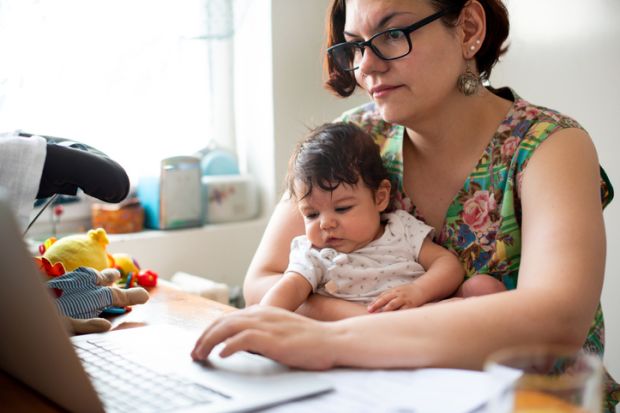Differences in the quality rather than the quantity of research time explain why publication decreased more for women than men during the pandemic, a study has concluded.
A survey of almost 3,500 academics at 14 Australian and Canadian universities has found that working from home arrangements affected both genders fairly evenly in terms of the time available for research, with about half of respondents of both sexes reporting declines.
Nevertheless, the pandemic disproportionately affected women’s research output, with “big gender differences” in journal submissions, grant applications and publications.
The study team believes female academics found it harder than their male colleagues to corral the “thinking time” necessary for tasks requiring sustained focus – namely, applying for grants and writing journal articles – because remote work blurred the boundaries between professional and domestic life.
“The norms of the domestic sphere were…exaggerated during the pandemic lockdown periods, so that women academics in our survey increased domestic labour – including home schooling – more than men,” the team reasons in the journal Labour and Industry.
“The pandemic reinforced…the division of work within the household [where] women do more of the caring and domestic duties.”
This has implications well beyond universities, the team points out. “‘Flexibility’ is often touted as a solution to work-life conflict and of particular benefit to women. But if ‘flexibility’ means more work is done at home…the sustained knowledge work that is critical to career advancement can become especially problematic for women.”
Lead author David Peetz, emeritus professor of employment relations at Griffith University, said that employers needed to recognise this as they envisaged a post-Covid world where more work happened at home. Universities might assume that “people can share offices or hot desk or go into open plan areas, because they won’t be here so often.
“But that in itself would cut down on opportunities. For some people – not for everybody, but for some people – it’s actually in the workplace where you’re getting the best time to think.”
Professor Peetz said that the “huge diversity” of attitudes to working from home reflected its disparate impacts. “For some people, it’s the best thing since sliced bread, and for others it’s terrible. A lot of women would think, this is…going to make life easier to balance [but they are] just getting too many interruptions. It’s too hard to find the time to think.”
The paper draws a distinction between “sustained knowledge work” necessitating long periods of concentration – constructing complex journal articles and funding bids, for example – and “episodic knowledge work” such as teaching classes, marking, reviewing documents or attending Zoom meetings.
The latter category “does not require as much cognitive load”, the paper explains. “Tasks can…be set aside and then recommenced, or they can be completed in a shorter time or with less attention.”
This could explain why female survey respondents tended to report the biggest increases in time spent on teaching, administration and service. “One interpretation is [that] women academics, feeling too tired or distracted to devote effort to sustained knowledge work, instead dealt with the immediate demands of teaching, service and administration; tasks they could attend to in shorter bursts.
“An alternative interpretation is in terms of risk avoidance, with women reducing time investments in sustained knowledge work activity that they may have expected to be relatively less fruitful due to their new contextual constraints.”
Register to continue
Why register?
- Registration is free and only takes a moment
- Once registered, you can read 3 articles a month
- Sign up for our newsletter
Subscribe
Or subscribe for unlimited access to:
- Unlimited access to news, views, insights & reviews
- Digital editions
- Digital access to THE’s university and college rankings analysis
Already registered or a current subscriber? Login










